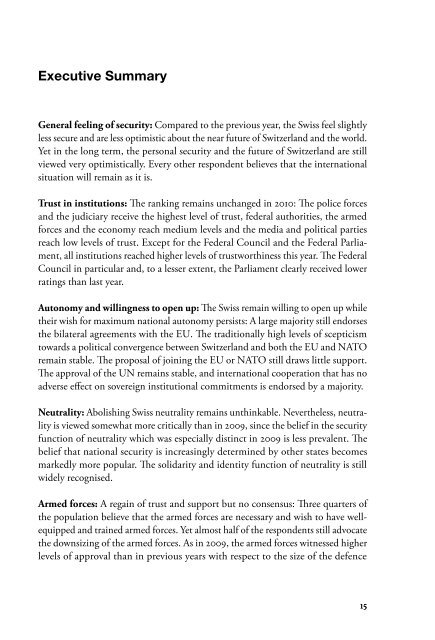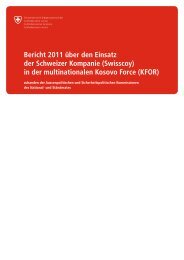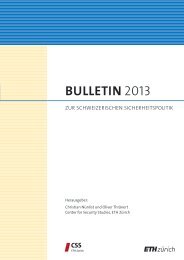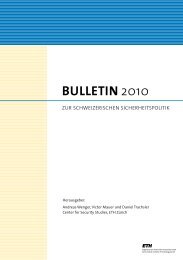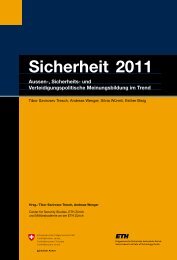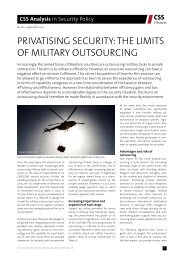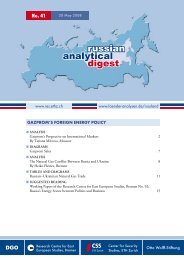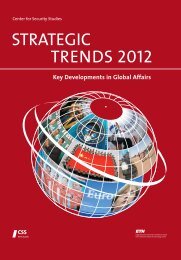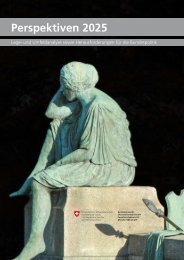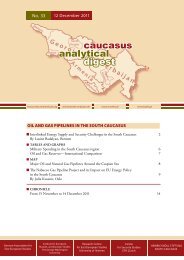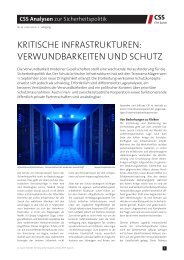Sicherheit 2010 - Center for Security Studies (CSS) - ETH Zürich
Sicherheit 2010 - Center for Security Studies (CSS) - ETH Zürich
Sicherheit 2010 - Center for Security Studies (CSS) - ETH Zürich
Erfolgreiche ePaper selbst erstellen
Machen Sie aus Ihren PDF Publikationen ein blätterbares Flipbook mit unserer einzigartigen Google optimierten e-Paper Software.
Executive Summary<br />
General feeling of security: Compared to the previous year, the Swiss feel slightly<br />
less secure and are less optimistic about the near future of Switzerland and the world.<br />
Yet in the long term, the personal security and the future of Switzerland are still<br />
viewed very optimistically. Every other respondent believes that the international<br />
situation will remain as it is.<br />
Trust in institutions: The ranking remains unchanged in <strong>2010</strong>: The police <strong>for</strong>ces<br />
and the judiciary receive the highest level of trust, federal authorities, the armed<br />
<strong>for</strong>ces and the economy reach medium levels and the media and political parties<br />
reach low levels of trust. Except <strong>for</strong> the Federal Council and the Federal Parliament,<br />
all institutions reached higher levels of trustworthiness this year. The Federal<br />
Council in particular and, to a lesser extent, the Parliament clearly received lower<br />
ratings than last year.<br />
Autonomy and willingness to open up: The Swiss remain willing to open up while<br />
their wish <strong>for</strong> maximum national autonomy persists: A large majority still endorses<br />
the bilateral agreements with the EU. The traditionally high levels of scepticism<br />
towards a political convergence between Switzerland and both the EU and NATO<br />
remain stable. The proposal of joining the EU or NATO still draws little support.<br />
The approval of the UN remains stable, and international cooperation that has no<br />
adverse effect on sovereign institutional commitments is endorsed by a majority.<br />
Neutrality: Abolishing Swiss neutrality remains unthinkable. Nevertheless, neutrality<br />
is viewed somewhat more critically than in 2009, since the belief in the security<br />
function of neutrality which was especially distinct in 2009 is less prevalent. The<br />
belief that national security is increasingly determined by other states becomes<br />
markedly more popular. The solidarity and identity function of neutrality is still<br />
widely recognised.<br />
Armed <strong>for</strong>ces: A regain of trust and support but no consensus: Three quarters of<br />
the population believe that the armed <strong>for</strong>ces are necessary and wish to have wellequipped<br />
and trained armed <strong>for</strong>ces. Yet almost half of the respondents still advocate<br />
the downsizing of the armed <strong>for</strong>ces. As in 2009, the armed <strong>for</strong>ces witnessed higher<br />
levels of approval than in previous years with respect to the size of the defence<br />
15


